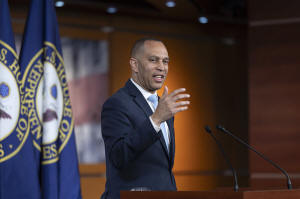Republicans try to go it alone on government funding as shutdown
deadline nears
[March 08, 2025]
By KEVIN FREKING
WASHINGTON (AP) — House Republicans are looking to do what, for them, is
almost unheard of —- approving government funding on their terms with
little help from Democrats.
Speaker Mike Johnson is teeing up a bill that would generally fund
federal agencies at current levels for the remainder of the budget year
ending Sept. 30. That would mean defense and non-defense programs would
be funded at 2024 levels. Congress must act by midnight March 14.
It's a risky approach. Normally, when it comes to keeping the government
fully open for business, Republicans have had to work with Democrats to
craft a bipartisan measure that both sides can support. That's because
Republicans almost always lack the votes to pass spending bills on their
own.
This time, Republicans have hopes of going it alone. They plan to muscle
the funding bill, known as a continuing resolution, though the House,
and then dare Senate Democrats to oppose it and risk being blamed for a
government shutdown.
Crucially, the strategy has the backing of President Donald Trump, who
has shown an ability so far in his term to hold Republicans in line.
“Let’s get this Bill done!” Trump said on social media.
Rep. Ralph Norman, R-S.C., says he has never voted for a continuing
resolution, what lawmakers often call a CR, but he is on board with
Johnson's effort. He says he has confidence in Trump and the Department
of Government Efficiency, led by Elon Musk, to make a difference on the
nation's debt.

“I don't like CRs,” Norman said. “But what's the alternative? Negotiate
with Democrats? No.”
“I freeze spending for six month to go identify more cuts? Somebody tell
me how that's not a win in Washington,” added Rep. Chip Roy, R-Texas,
another lawmaker who has often frequently voted against spending bills
but supports the six-month continuing resolution.
Republicans are also hoping that resolving this year's spending will
allow them to devote their full attention to extending the individual
tax cuts passed during Trump's first term and raising the nation's debt
ceiling to avoid a catastrophic federal default.
But Democratic leaders are warning that the decision to move ahead
without consulting them increases the prospects for a shutdown. One of
their biggest concerns is the flexibility the legislation would give the
Trump administration on spending.
"We cannot stand by and accept a yearlong power grab CR that would help
Elon take a chainsaw to programs that families rely on and agencies that
keep our communities safe," said Sen. Patty Murray, the lead Democrat on
the Senate Appropriations Committee.
[to top of second column]
|

House Minority Leader Hakeem Jeffries, D-N.Y., speaks during a news
conference at the Capitol, in Washington, Thursday, March 6, 2025.
(AP Photo/J. Scott Applewhite)

Democratic leadership in both chambers has stressed that Republicans
have the majority and are responsible for funding the government. But
they also have been wary of saying how Democrats would vote on a
continuing resolution.
“We have to wait to see what their plan is,” Schumer said. “We've always
believed the only solution is a bipartisan solution, no matter what.”
House Democratic leader Hakeem Jeffries said earlier this week that the
Democratic caucus would meet and discuss the legislation at the
“appropriate moment.” But he struck a more forceful tone Friday.
Jeffries said Democrats are ready to negotiate a “meaningful, bipartisan
spending agreement that puts working people first.” But he said the
“partisan continuing resolution” threatens to cut funding for key
programs, such as veterans benefits and nutritional assistance for
low-income families.
“That is not acceptable," Jeffries said.
While continuing resolutions generally keep spending flat, many
lawmakers say that failing to keep pace with inflation actually leads to
a cut in services.
Trump has been meeting with House Republicans in an effort to win their
votes on the legislation. Rep. Tim Burchett of Tennessee, along with
more than a dozen other lawmakers, met with Trump on Wednesday.
“I'm open to it,” Burchett said. “But I want to see what's in it.”
Republicans have a 218-214 majority in the House, so if all lawmakers
vote, they can afford only one defection if Democrats unite in
opposition. The math gets even harder in the Senate, where at least
seven Democrats would have to vote for the legislation to overcome a
filibuster — and that's assuming all 53 Republicans vote for it.
Rep. Tom Cole, R-Okla., has said that passage of the measure covering
the remainder of the fiscal year doesn't preclude further negotiations
to pass the regular appropriations bills for the budget year.
A Democratic aide speaking on condition of anonymity confirmed that such
talks have reopened as the two sides try to reach agreement on topline
spending levels. The talks could amount to a Plan B should the
continuing resolution falter.
All contents © copyright 2025 Associated Press. All rights reserved |